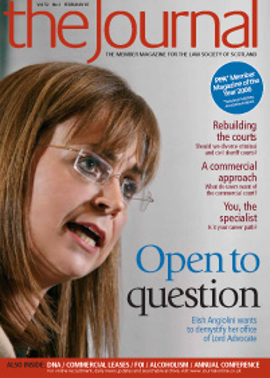A claim in trust

It is increasingly common for family law practitioners to encounter cases involving assets situated abroad. This can present something of a challenge when it comes to enforcement. It is also not uncommon, particularly in high net worth cases, to discover that certain assets have been placed in an offshore trust, and thus potentially beyond the reach of a spouse.
The recent opinion of Lord Brodie in the case of AB v CD and Bank of Scotland Trust Company (International) Ltd [2006] CSOH 200, 22 December 2006, addresses both of these points.
This was a Court of Session divorce in which the wife sought financial provision. At the date of separation, most of the husband’s assets – consisting of the former matrimonial home, cash and shares in unquoted companies – were held in a Jersey trust and not by the husband himself. It was argued for the wife that the items held in trust ought to be regarded as matrimonial property on the basis that, in reality, the husband controlled the trust and operated it as though it were his own personal “piggy bank”. The husband maintained that these items were not matrimonial property, the trust being irrevocable, discretionary, and accountable to various beneficiaries apart from him.
For his benefit
Shortly prior to proof, the husband’s agents withdrew and he was neither represented nor appeared personally at the proof. Having heard evidence and submissions for the pursuer, Lord Brodie concluded that the assets appearing in the balance sheet of the trust at the relevant date were indeed matrimonial property. He considered that they should be regarded as “property belonging to” the husband in terms of s 10(4) of the 1985 Act. Evidence had been led which supported the wife’s contention that the husband did in fact control the trust. The original purpose of the trust had been to place certain assets beyond the reach of the husband’s creditors. The husband issued instructions to the trustees upon which they invariably acted. There was no evidence that they had at any time exercised independent discretion. Lord Brodie considered that the trust was no more than a means of managing assets for the benefit of the husband.
Accordingly, the wife was awarded a capital sum of £1,000,000. This brings us to the second interesting aspect of the judgment. By the time of the proof, the husband no longer resided in Scotland. None of his assets were situated in Scotland. The funds held in the Jersey trust had long since been dissipated. Decree for £1,000,000 was only useful to the wife insofar as it was capable of enforcement.
Capital awards and maintenance
As matters presently stand, an order for financial provision made pursuant to divorce proceedings may only be registered for enforcement in terms of the EC Convention on Jurisdiction and the Enforcement of Judgments in Civil and Commercial Matters (“Brussels I”) and the parallel Lugano Convention if it is an order “relating to maintenance”. An order in respect of “rights in property arising out of a matrimonial relationship”, as between separating spouses, may not be registered for enforcement in terms of this Convention framework.
There is no definition of “maintenance” contained in Brussels I, but the European Court of Justice has considered this issue and has held that an order relating to maintenance does not have to be expressed in instalments, but can include a capital sum or property transfer order, provided it is clear that the order has been made for the purpose of maintenance (Van den Boogaard v Laumen [1997] ECR I-1147).
Very unusually, Lord Brodie was therefore asked in this case to specify the precise proportion of any capital sum awarded, which was intended to relate to maintenance. In his judgment, Lord Brodie concludes that, although courts in Scotland do not in most cases have explicitly to go beyond applying s 9(1)(a) of the 1985 Act, which provides for the fair sharing of matrimonial property, in reality the courts are concerned with all of the various s 9 principles, in making any order for financial provision. Just because an order is not made under s 13(2) does not mean that the order has nothing to do with maintenance. Accordingly, a capital sum order which has the effect of dividing the parties’ matrimonial property may also be attributable in part to maintenance. In this case, it was held that £500,000 of the capital sum awarded should be so attributed. In practical terms, this should enable the wife to register her award to the extent of £500,000 for enforcement abroad in terms of Brussels I. It may be worthwhile asking a court specifically to make this attribution to maintenance, in any case where overseas enforcement may be an issue.
Rhona Adams, Morton Fraser LLP Family Law Team
In this issue
- Routes to qualification: the Italian picture
- Speaking of change
- Disabled from suing?
- Hearing and answering
- Court afresh
- Clean sheet at the Commercial Court
- Making a specialism pay
- LCN DNA - devil in the detail
- To buy or not to buy?
- Just a winter warmer?
- Views from the new boy
- Working out time
- A claim in trust
- Incapable of dismissal?
- Chasing debts made simple?
- Scottish Solicitors' Discipline Tribunal
- Website reviews
- Book reviews
- FOISA goes to court
- On the wrong track?






